Do you have a hardware wallet for your cryptocurrency?
While I am new to the crypto-universe, my partner and I have built a portfolio and are looking to keep some of our holding-crypto in a safer place than our digital wallets. While Coinbase and HitBTC have been good learning platforms for us, we want something more secure. I'm doing research to determine which wallet we should purchase. I'm outlining the ones I've found below and my take on them, but more importantly:
Would you share your opinion or experience?
If you have a hardware wallet, have done more research than I have, or have chosen to not go hardware for your crypto-storage, I'd love to get your perspective and learn.
For those of you that have not yet found these resources, I hope what I've surmised here can get you started in the right direction!
Here's what I've learned to look for in a Hardware Cryptocurrency Wallet
- Basics: Size, material, price, connection
- What currency they support
- Wallet software and how to access it
- How to recover a lost key
- Secure sign-in/on
- Purchasing options (website, Amazon, secure sellers)
- Recovery protocol should you lose your device
Cryptocurrency Wallet Choices: Hardware
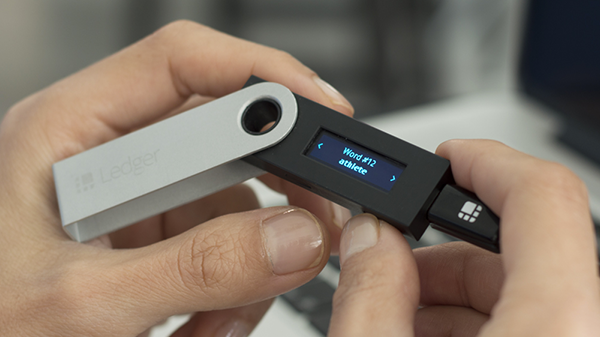
image from Ledger
Ledger Nano S - 79€ / ~$100 currently: out of stock
The first wallet I found and in my opinion, the most attractive. The Ledger Nano S is akin to a thumb-drive with a swing closure and a compact size. It plugs into your computer with a USB micro-B. It's sleek with brushed stainless looking elements and has a small screen accompanied by buttons sleek, unobtrusive for controlling your currency and transactions directly from the device. In the product description, Ledger Nano S claims it supports altcoins and lists them at the bottom. Obviously, there are extensively more altcoins than listed here, but are you holding a lot of altcoins in a wallet?
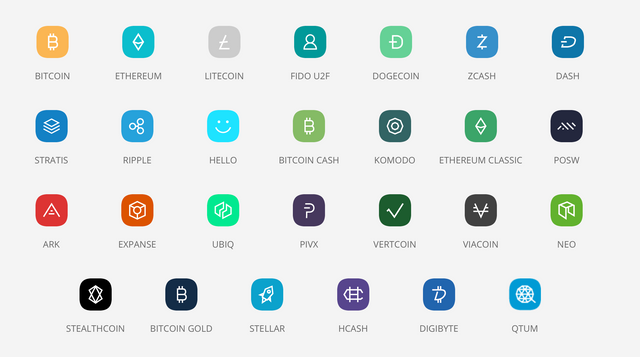
screenshot from Ledger Nano S
Our altcoin strategy to-date has been swing trading and otherwise liquid usage. Keeping smaller amounts of altcoins has been just fine in our digital wallet.
You can purchase this device directly from the Ledger website, which seems ideally more secure than an Amazon retailer or affiliated seller.
Security & Recovery
- PIN Sign-on
- Recovery Phrase
- FIDO® Universal Second Factor authentication standard
- Backups stored on Recovery Sheet and recoverable on any Ledger device (This I don't quite understand)
Major con: This wallet is only for pre-order and the first shipping date is March 22, three months away! Is it worth waiting? We'll find out!
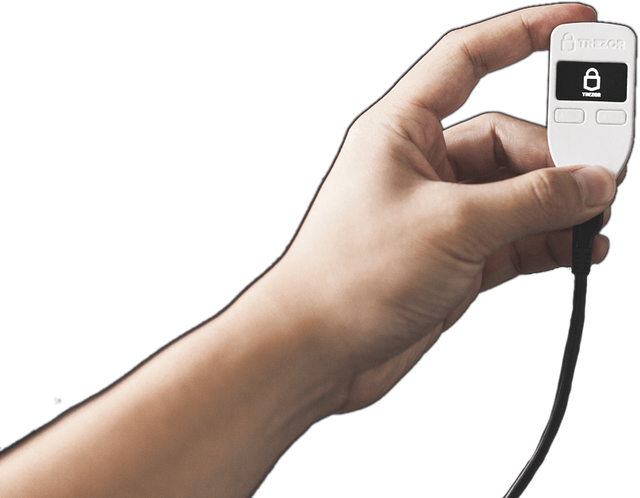
image from Trezor.io
Trezor Bitcoin Wallet - 89€ / ~$110 Available here and on Amazon
Maybe it's because I'm a millennial, but I didn't love the Trezor the first time I saw it - mainly, because of the cord and obvious buttons. Perusing the website led to me either have to download the wallet software to learn more about its supported currencies (only listed are Bitcoin, Litecoin, Dash, ZCoin, Bitcoin Cash and Bitcoin Gold), and to go through a lengthy FAQ document to answer my questions.
As an Etherium holder, having to integrate with another app, My Ether Wallet, isn't as attractive to me. I'd rather keep my cryptocurrency activities as streamlined as possible and to not have my data or information spread across multiple platforms. However, this wallet is available for purchase today and through Amazon, which makes it very easy!
Visiting their Amazon link took me to a "See All Buying Options" purchasing environment where sellers were not Trezor at all. Is this a red flag to anyone else but me?
Security & Recovery
- Recovery seed to recover PK, bitcoin balance, transaction history into a new device should you lose yours
- PIN to open - entered on your computer, not the device
- Encryption passphrase on-top of PIN, which they advertise is military-grade and not even breakable inside a laboratory
Here's an image that explains why a SEED passphrase is more secure than a password
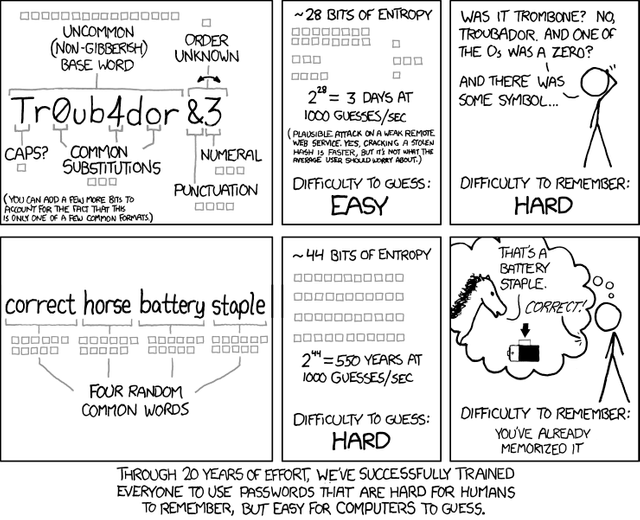
Comic by XKCD: Randall Munroe, licensed under Creative Commons Attribution-NonCommercial 2.5 License.
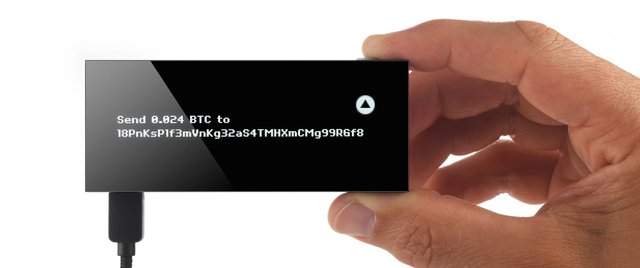
image from Google Search
Keep Key - $139 Available on Amazon <-- this is an affiliate link for Amazon
Keep Key caught my eye with its full touch-screen on its tiny sleek body. It, too, is corded but unplugs to be a sleek, brushed stainless look (actually anodized aluminum) and black rectangle. In their overview video, which using a lot of panning and zooming of a talking-head description, they highlight that the KeepKey can be used with a software installed as a Google Chrome plugin, but if you're not a Google Chrome user (oh I know, let me have it), can you still use the software? As well, the software engineer in the video discusses that should you arrive at a website checkout cart that supports bitcoin, you can pay that website utilizing your wallet. I'm not sure how that securely works, as you're transmitting data from an extremely secure place through a website with varying degrees of security.
The KeepKey supports bitcoin, ethereum, litecoin, dogecoin, namecoin, and dash (for now) which is a healthy mix for me.
Security & Recovery
- Cryptographic certification from: "STM32F205RGT6 MCU from STMicroelectronics, and it has received certifications in FIPS PUB 140-2, and FIPS PUB 180-2." From the KeepKey FAQ. Seems legit
- Recovery SEED passphrase
- Advertised tamper-proof packaging and security seal to ensure your KeepKey hasn't been tampered with
- KeepKey generated Private Keys - not sure I understand this, as I thought we already had a private key? Recovery with passphrase/sentence on any device that supports: BIP39 and BIP44
Final thoughts
It seems as though Chrome is the necessary browser for doing any crypto-activities with a hardware wallet and its software. This isn't a big deal for me, but it's something to note for Mac users who may be partial to Safari for any reason. As well, I am still very much a newbie when it comes to cryptocurrency, crypto-security, and trying to explain it all.*
In no way is this post meant to make me seem like I know what I'm talking about! I simply hope to share what I've found, learn from anyone who is gracious enough to engage/answer my questions throughout this post, and spread my love for crypto.
My guy had the nano s and I was with him as he set it up. This took a while because of the recovery process what makes retrieval possible. There are 20+ words that are displayed in a specific order that you must record and verify with the wallet when you set it up. You use a pin to access it regularly, but if you were recovering a wallet on a different device, you need all of those words, in the right order and it will ask you to input the words as it gives you the number position. This means if someone grabbed it from your bag, unless they know your pin, they won't be able to do a thing with it and you just need to buy a new one.
I am eagerly awaiting late March and sending protective thoughts to coinbase until then :)
Downvoting a post can decrease pending rewards and make it less visible. Common reasons:
Submit
Awesome! Thank you for your reply.
Downvoting a post can decrease pending rewards and make it less visible. Common reasons:
Submit
@OriginalWorks 🤯
Downvoting a post can decrease pending rewards and make it less visible. Common reasons:
Submit